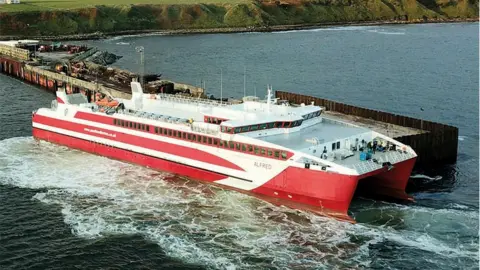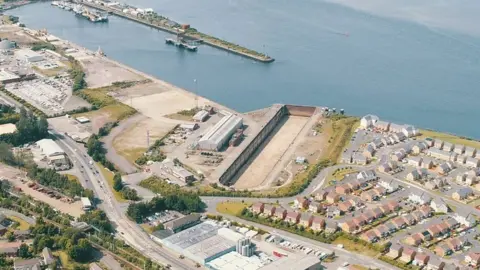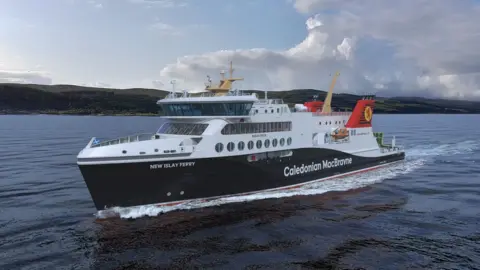Why a CalMac catamaran is such a big deal
 Pentland Ferries
Pentland FerriesScottish ferry operator CalMac is chartering a catamaran to provide relief services on its west coast routes as its ageing fleet struggles with frequent breakdowns.
But the decision has a much wider significance, feeding in to the debate on how best to fix Scotland's ferries crisis.
For years a vocal group of campaigners have argued that catamarans offer a cost-effective and environmentally-friendly way of renewing the CalMac fleet.
With their high car-carrying capacity, ability to navigate shallow harbours, fuel efficiency and shorter build times they say catamarans offer the ideal solution, rather than the large, complicated, heavily-crewed, mono-hulled ships favoured by the Scottish government's ferries procurement agency CMAL.
MV Alfred normally sails across the Pentland Firth from Gills Bay in Caithness to St Margaret's Hope in Orkney.
It was manufactured in Vietnam at a cost of £14.5m. Campaigners argue a similar ship could be built for about £25m paying European wage levels - which is roughly half the amount CMAL is spending on each of four mono-hulls it recently ordered from Turkey.
The Mull and Iona Ferry Committee have been won over by the arguments - two years ago they tried in vain to persuade CMAL to buy a similar catamaran offered for sale, brand new, for a bargain price of just £10m.
They are now so frustrated with CalMac's ferry services they are thinking of buying a catamaran of their own as an alternative.
 Jim Phanco
Jim PhancoThere have been suggestions such catamarans could be assembled at the state-owned Ferguson Marine shipyard in Port Glasgow - turning the yard into a production line for a rapid renewal of the CalMac fleet.
The nearby Inchgreen dry dock, owned by Peel Ports and barely used in two decades, would be an ideal place to put them together, say campaigners.
Interestingly, CalMac's charter of MV Alfred has not involved the Scottish government-owned ferries procurement agency CMAL.
CMAL insists it is not anti-catamaran - but it questions whether such vessels are suitable for all the routes CalMac operates on Scotland's blustery west coast.
The agency's boss Kevin Hobbs says they are considering a small catamaran for the Gourock-Kilcreggan route on the Clyde - but the Minch, the strait between the Highlands and the outer Hebrides, might be another matter.
Mr Hobbs says catamarans are not a common choice for ferry services with weather conditions similar to the west of Scotland.
The catamaran lobby rejects suggestions they are unsuitable for Scottish waters - the Pentland Firth off the north of Scotland, where such ships have operated for years, is hardly a millpond.
They say Pentland Ferries' catamaran is considered more reliable on that route than the CMAL-owned mono-hulls operated by rival operator Northlink.
People I have spoken to in the ferry industry who are not firmly entrenched in either camp have told me the sensible option would be to charter a catamaran for a season and see how it performs.
And that is exactly what CalMac has now done (although the £9m price tag for chartering a vessel for nine months that only cost £14.5m to build might raise some eyebrows).
So there's a lot riding on this charter.
If MV Alfred struggles with the routes, CMAL will be vindicated - but if it performs well, CMAL's procurement strategy over the past 16 years faces further questions.
And then there's the elephant in the room.
One of the reasons the vessels procured by CMAL are so big is because CalMac provides its crews with high-quality onboard accommodation, often taking up a whole deck level. MV Alfred also has crew cabins but they are more utilitarian.

Critics say having crews living on board is an antiquated system, dating back to the days of the Clyde puffers, the little steamships that once supplied the west coast and the Western Isles.
If they moved to a system of shore-based crewing as happens in other countries - they argue - these ships could operate with far smaller crews, and operate for longer hours. More ferries operating a more frequent service - thus solving the crisis of capacity in the network.
Some island representatives have also suggested that crews living on shore would be more family-friendly for mariners, and encourage younger families to settle in the islands.
It would also mean that CalMac ships could lose a deck level, reducing their "windage". In landlubber's language, that means they would be less susceptible to weather disruption.
The counter argument, advanced by CMAL and CalMac, is that its high-spec crew accommodation helps with recruitment and operational flexibility. If they need to divert because of bad weather it is not a problem.
And then there is the RMT. The union does what unions are meant to do - it champions the rights of seafarers, advancing their working conditions and wages. Anything perceived as undermining those would be resisted.
I suspect no-one at CMAL, CalMac or the Scottish government is spoiling for a fight with the RMT right now.
RMT regional organiser Gordon Martin says the cost of chartering MV Alfred is "outrageous" - but denies his union has a closed mind on catamarans.
"It could be the strategy - but it's been Transport Scotland who have always said catamarans aren't suitable," he told the BBC.
Back to the catamaran lobby - they say concerns about CalMac jobs are groundless.
"These ships are so much cheaper to produce, there would be no need to cut jobs," says Robert Buirds, a lifelong trade unionist who leads the Campaign to Save Inchgreen Dry Dock in Inverclyde.
"Scotland could afford more vessels, running more frequent services with smaller crews so the net impact on the workforce would be negligible."
And so the arguments have gone on and on in endless circles, except now there's a chance to put the issue to the test.
The performance of MV Alfred will be watched very closely in the coming months.
A catamaran operating on CalMac's west coast routes is a really big deal indeed.
